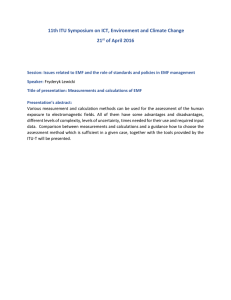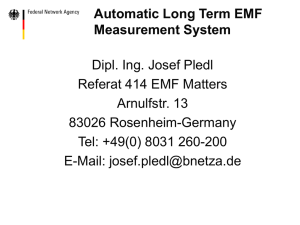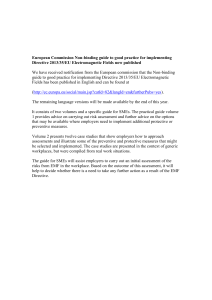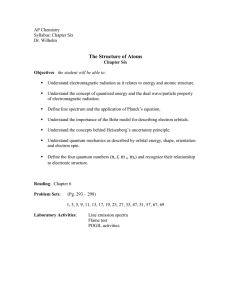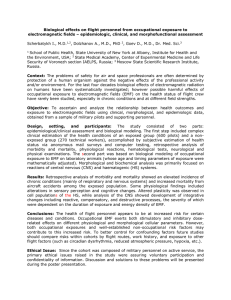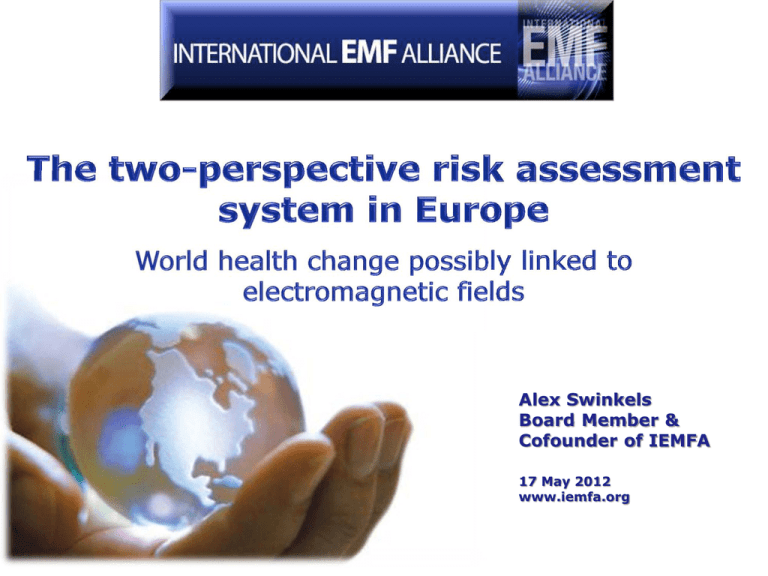
Alex Swinkels
Board Member &
Cofounder of IEMFA
17 May 2012
www.iemfa.org
Traditional ‘EMF
‘EMF-Safety’
‘EMFSafety’ community
“No hard evidence for health risks”
“No
Recent ‘EMF
‘EMF-Health’
‘EMFHealth’ community
“World health at risk, since evidence of
“World
serious disruption to biological systems
Associations with many of the
increasing chronic diseases & disorders”
Level of precautionary action
Low
►
High
Level of risk evidence
Low
►
High
Action profiles
of policy advisors
Weiss 2003
Scientific/technical absolutist
◄ (EMF-Safety community)
◄
Cautious environmentalist
(EMF-Health community)
Traditional
‘EMF--Safety’
‘EMF
community
Recent
‘EMF-Health’
‘EMF-Health’
‘EMF
community
Policy
Regulations
Research
Communication
Education
Financial flows
Technological
Techn
ological industries
KEMA, IATA, Telecom IA, IEEE IAS
Technical and
medical experts
ACGIH, HPS, IEEE, IRPA, NRPSs
NRPSs,, SCENIHR,
WHO IARC
Technical
advisory bodies
ICNIRP, NCRP, EMF-NET
EMF NET
EMF-
- Last century –‘establishment’
Governments
and Authorities
EU Council, EU Commission
Commission, COST, NGovs
NGovs, WHO, NHAs
Technical
implementing bodies
CENELEC, CIE, IEC, ILO
Health & Environment
Advisory bodies
ENSSER, EEA, HDO, EPA, HEAL, IEMFA, RNCNIRP
Health-oriented
HealthHealth
oriented
Life Sciences
BEMS, BioInitiative Group, Ecolog
Ecolog,, ICEMS
Public-Health
PublicPublic
Health and
Environment doctors
Workers,, Patients &
Workers
Civil institutions
CHE, EUROPAEM, HICs
HICs,, ISDE, NMAGs
ETUC, EPSU, AMICA, EFBWW, EU Parl
Parl,, PACE, NGOs
-Last decades –recent network
The ‘Exact Physics’ paradigm
of the traditional EMFEMF-Safety community
The ‘Complex Biology’ paradigm
of the recent EMF-Health
EMF-Health community
EMF
Traditional
Advice
i
n
p
u
t
P
o
l
i
c
y
Additional
Advice
input
P
o
l
i
c
y
Liability
The International EMF Alliance sets this presentation available through her website www.iemfa.org. While utmost
care has been paid to the content of this presentation by means of a review of the available literature and reports,
the International EMF Alliance Foundation, the members of this organization, the authors of this presentation and
their organizations do not accept any liability for any omission, inaccuracy or the consequences thereof. Use of the
content of this presentation is the responsibility of the user.
Copyright @ 2012
International EMF Alliance. All rights reserved. No part of this presentation may be reproduced, stored in
automated files and/or made public by means of photocopy, microfilm, tape or any other electronic means, without
the prior permission of the International EMF Alliance Foundation. It is permitted to quote parts of this presentation
using the following reference: “International EMF Alliance. The Two-Perspective Risk-Assessment System in Europe
- World Health Change Possibly Linked to Electromagnetic Fields; Overview presented by A. Swinkels on conference
Risks for Public Health and the Environment, Madrid 17 May 2012.”
Advisory Council for Research on Spatial Planning, Environment and Nature. ´New risks into the picture?´, Ph van
Notten, To learn from early warnings, meta-analysis of ‘Late lessons from early warnings’, Essay Series 2004.
Andlin-Sobocki P, B Jönsson2, HU Wittchen and J Olesen, Costs of Disorders of the Brain in Europe. European
Journal of Neurology. Volume 12, Suppl 1. June 2005.
Australian Medical Association (AMA), Guideline of the Australian Medical Association for the diagnosis and
treatment of EMF-related health problems and illnesses (EMF-syndrome). Consensus paper of the AMA’s EMF
Working Group, 3 March 2012.
BioInitiative Working Group, BioInitiative Report: A rationale for a biologically-based public exposure standard for
electromagnetic fields (ELF and RF). Pathophysiology, Volume 16/2,3, pp. 67-248, August 2009. Original
BioInitiative Report 2007. Last update April 2011.
BioInitiative Working Group, BioInitiative Report: A rationale for a biologically-based public exposure standard for
electromagnetic fields (ELF and RF). Original BioInitiative Report 2007. Large parts published as Special issue on
EMF. Blank M, editor, Pathophysiology, Volume 16/2,3, pp. 67-248, August 2009. Update April 2011.
Council of the European Union, Council recommendation on the limitation of exposure of the general public to
electromagnetic fields (0 Hz to 300 GHz), July 12, 1999.
Dehue T, The Depression Epidemics (De Depressie-epidemie), Amsterdam 2008.
Deventer E van, The WHO International EMF project, World Health Organisation, presentation Lima, Peru, 19 June
2006.
EurActiv.com, EU news and policy debates, ‘Tackling health inequality could boost economy’, 11 January 2010.
EurActiv. Costs of Disorders of the Brain in Europe, European Journal of Neurology. Volume 12, Suppl 1. June
2005.
European Academy for Environmental Medicine (EUROPAEM), International Appeal from Würzburg. April 25 2010.
European Brain Council, Costs of Disorders of the Brain in Europe since January 2012, media
information 2010. European Commission, Scientific Steering Committee, Opinion on possible health
effects from exposure to electromagnetic fields (0 Hz - 300 GHz) - Report and opinion at the meeting of
the Scientific Steering Committee of 25-26 June 1998.
European Commission, Scientific Committee on Toxicity, Ecotoxicity and the Environment (CSTEE), Opinion on
Possible effects of Electromagnetic Fields (EMF), Radio Frequency Fields (RF) and Microwave Radiation on human
health, expressed at the 27th CSTEE plenary meeting; Brussels, 30 October 2001.
European Commission, Electromagnetic fields, EU Actions, last update October 4, 2011.
European Commission, EMFs at work, Employment, Social Affairs & Inclusion, Second stage social partner
consultation on electromagnetic field legislation, 20 May 2010.
European Commission, FP7 call ENV.2011.1.2.2-2 ‘Exposure to electromagnetic fields (EMF): investigations of
mechanisms to support risk assessment and reduce uncertainty, July 2010.
European Commission, Special Eurobarometer 73.3, Electromagnetic fields. June 2010.
European Council, Council recommendation of 12 July 1999 on the limitation of exposure of the general public to
electromagnetic fields (0 Hz to 300 GHz); 1999/519/EC.
European Environment Agency (EEA), Late lessons from early warnings: the Precautionary Principle 1896 - 2000.
Environmental Issue Report No 22, 2001.
European Environment Agency (EEA), Evaluating and Communicating Scientific Evidence on Environment and
Health Issues, Report of the workshop at the European Environment Agency, Copenhagen 28th and 29th of May
2008.
European Environment Agency (EEA), EMF: Evaluating evidence and use of the precautionary principle.
Presentation D Gee, Science, Policy, Innovation, Copenhagen, March 2009.
European Environment Agency (EEA), J McGlade. Statement on mobile phones for conference on cell phones and
health: science and public policy questions, Washington, 15 September 2009.
European Fast Response Team on EMF and Health; European Commission Framework Program 6 Coordination
Action EMF NET, Effects of the exposure to electromagnetic fields: from science to public health and safer
workplace. Fact sheet on the interpretation and risk assessment initiatives on EMF and health,
September 18, 2007.
European Federation of Allergies and Airways Diseases Patients Associations (EFA), Manifesto of
the European Allergy Patient, 2002.
European Parliament, Resolution ‘Health concerns associated with electromagnetic fields’, 2 April 2009.
EUROSTAT, Populations and social conditions, Statistics in focus, 63/2009.
Fragopoulou A, Grigoriev Y et al. Scientific panel on electromagnetic field health risks: consensus points,
recommendations, and rationales, Scientific meeting Seletun, Norway, November 17-21, 2009. Reviews on
Environmental Health, Volume 25, No.4, 2010.
Gale Encyclopedia of Public Health. Multifactorial diseases, 2011.
Graham Ch, ‘Biological effects of ELF exposure: human laboratory studies' In: Matthes R, Bernhardt JH, Repacholi
MH editors. Proceedings of the International seminar on biological effects of static and ELF electric and magnetic
fields and related health risks, Bologna Italy June 4 and 5, 1997:171-186.
Hajer M, The energetic society, PBL Netherlands Environmental Assessment Agency, 2011.
Handbook Genetics Home, U.S. National Library of Medicine, part of the National Institutes of Health, an agency of
the Department of Health and Human Services, 2011.
Health Council of the Netherlands, ‘Health Effects of Low level Exposure’ (HELLE), 1998/18.
Health Council of the Netherlands, The chronic fatigue syndrome, Advisory report with executive summary in
English, 2005/2.
Hulme M, Why We Disagree About Climate Change; Understanding Controversy, Inaction and Opportunity.
University of East Anglia, 2009.
International Commission on Non-Ionizing Radiation Protection (ICNIRP), Guidelines for limiting exposures to timevarying electric, magnetic and electromagnetic fields (up to 300 GHz), Health Physics, Volume 24, No 494-522,
1998.
Institute of Electrical and Electronics Engineers (IEEE), IEEE EMF Health & Safety Standards. PA Mason, MR
Murphy, Ronald C Petersen, circa 2002.
Institute of Electrical and Electronics Engineers (IEEE), Developing standards for the safe use of
electromagnetic energy, circa 2002.
International Commission on Non-Ionizing Radiation Protection (ICNIRP), Guidelines for limiting exposure to timevarying electric, magnetic and electromagnetic fields (up to 300 GHz), Health Physics, Volume 74, No 4, 494-522,
April 1998.
International Commission on Non-Ionizing Radiation Protection (ICNIRP), General approach to protection against
non-ionizing radiation. Health Physics. Volume 82, No 4, April 2002.
International Commission on Non-Ionizing Radiation Protection (ICNIRP), Factsheet on the guidelines for limiting
exposure to time-varying electric and magnetic fields (1 Hz - 100 kHz) published in Health Physics 99(6):818-836;
2010
International Commission on Non-Ionizing Radiation Protection (ICNIRP), Guidelines for limiting exposure to timevarying electric, magnetic and electromagnetic fields (1Hz to 100 kHz), Health Physics, Volume 99, number 6,
December 2010.
International Commission for Electromagnetic Safety (ICEMS), eds. Guiliani, L and Soffritti, M, Ramazzini Institute,
Non-thermal effects and mechanisms of interaction between electromagnetic fields and living matter, European
Journal of Oncology Library, Vol 5, 2010.
International Committee on Electromagnetic Safety (IEEE/ICES), Approved Minutes of the IEEE/International
Committee on Electromagnetic Safety TC95, Nokia House, 30 November 2007.
International EMF Alliance (IEMFA), Progressive stages in world-wide knowledge development regarding
electromagnetic fields & health Developing conception of associated health effects. Discussion paper update July
5th, 2010.
International EMF Alliance (IEMFA), World health urgently needs lower EMF standards, international scientists say.
Press Release to announce Scientific Consensus Statement, February 2011.
International EMF Alliance (IEMFA), Stenberg K, Opinion of the International ELF Alliance (IEMFA) on
the Need for Independent and Credible Environmental Assessment, IEMFA, Strasbourg March 15, 2011.
International EMF Alliance (IEMFA), Call for transparent, Impartial and Pluralist Expert Assessment on
health risks of non-ionizing electromagnetic fields, Letter to Commissioner John Dalli, Health and
Consumer Policy, November 2011.
Johansson O, Open letter to whom it may concern. Karolinska Institute, Stockholm, January 17 2011.
Kahneman D & Tversky A , Choices, values and frames. American Psychologist 39: 341–350, 1984.
Kuhn ThS, The structure of scientific revolutions. University of Chicago Press 1962.
Maes W, Building biology and environmental analysis, comparison electro-smog, Situation April 2003 (in German).
Maisch D, The Procrustean approach, Setting exposure standards for telecommunications frequency
electromagnetic radiation. An examination of the manipulation of telecommunications standards by political,
military, and industrial vested interests at the expense of public health protection, PhD Thesis 2010.
Maisch D, Conflict of interest & bias in heath advisory committees: a case study of the WHO’s electromagnetic field
(EMF) task group. J.Aust.Coll. Nutr. & Env. Med. Volume 25 No. 1, p 15-17, April 2006.
McGarity ThO, Wagner WE, Bending Science. How Special Interests Corrupt Public Health Research. Harvard
University Press, 2008.
Micheals D, Doubt is their product: How industry’s assault on science threatens your health. OUP USA 1 May 2008.
Nilsson M, Leading expert Anders Ahlbom linked to the telecom industry. Conflict of Interest at the WHO, Press
release, 23 May 2011.
Oreskes and Conway, Merchants of doubt, how a handful of scientists obscured the truth. Bloomsbury press 2010.
Parliament of the European Union. Resolution on health concerns associated with electromagnetic fields.
INI/2008/2211. April 2, 2009.
Parliamentary Assembly of the Council of Europe (PACE), Committee on the Environment, Agriculture and Local and
Regional Affairs, with co-operation of AKUT, Environmental Health and indoor Air Quality Association, Health and
Environment Alliance and European Academy for Environmental Medicine. Environment and health indoor pollution
and multisystem illnesses. Proceedings, Strasbourg, 5 December 2008.
Parliamentary Assembly of the Council of Europe (PACE), The potential dangers of electromagnetic fields and their
effect on the environment, Resolution 1815. PACE calls on governments to ‘take all reasonable
measures’ to reduce exposure to electromagnetic fields, 27 May 2011.
Qin X. What caused the increase of autoimmune and allergic diseases: A decreased or an increased
exposure to luminal microbial components? World Journal of Gastroenterol 13(8): 1306-1307, 2007.
Ramazzini Institute, Non-thermal effects and mechanisms of interaction between electromagnetic fields and living
matter. An ICEMS Monograph edited by L Giuliani and M Soffritti, Eur J. Oncol. Library Volume 5, Italy 2010.
Rampton and Stauber, Trust us, we’re the experts. How industry manipulates science and gable with our future.
Tarcher/Putnam NY 2002.
Rayner, St; Business World, 22 June 2009.
Resolutions and appeals of multidisciplinary oriented groups of life-scientists and medical doctors warning for longterm health risks of EMFs and stressing the need for precautionary principle, presented to authorities, governments
and the wider public; 2002 - 2011.
Russian Ministry of Health, Sanitary Rules (Russian), SanPiN 2.1.8/2.2.4.1190-03 point 6.9.
Russian National Committee on Non-Ionizing Radiation Protection, Electromagnetic fields from mobile phones:
health effect on children and teenagers. Resolution, Moscow, April 2011.
Russian National Committee on Non-Ionizing Radiation Protection, Russian committee urgently warns for risks of
exposure to electromagnetic fields. Open letter of the Russian radiation committee, May 5, 2008.
Scientists of the International Workshop on Non-Ionizing Radiation, Health and Environment on May 18 and 19,
2009, The Porto Alegre Resolution, September 15, 2009.
Scientific Steering Committee of the European Commission, Opinion on possible health effects from exposure to
electromagnetic fields (0 Hz - 300 GHz) - Report and opinion adopted at the meeting of the Scientific Steering
Committee of 25-26 June 1998
Scientific Steering Committee of the European Commission, opinion 1998
Scientists of the International Workshop on Non-Ionizing Radiation, Health and Environment on May 18 and 19,
2009, The Porto Alegre Resolution. September 15, 2009
Sham P, Bishop T and Bishop T, Analysis of Multifactorial diseases, Acedemic Press, 12 February 2000.
The Steering Committee, European Commission EMF-NET Coordination Action - Effects of the
exposure to electromagnetic fields: from science to public health and safer workplace. Comments on
the BioInitiative Working Group Report (BioInitiative Report). October 30, 2007.
Union of Concerned Scientists, Heads They Win, Tails We Lose – How Corporations Corrupt Science
at the Public’s Expense, February 2012.
VanAsselt MBA (ed). Meta-analysis ‘Late lessons from early warnings’ (Ph Notten), in New risks into the picture?
(Nieuwe risico’s in het vizier?), Dutch Advisory Council for Research in Spatial Planning, Nature, and the
Environment (RMNO) essays series, Lemma, The Hague 2004.
Vechia P, The view from ICNIRP. Presentation on workshop on EMF and health: science and policy to address public
concerns. Brussels 11-12 February 2009.
Weiss Ch, Scientific uncertainty and science-based precaution - International environmental agreements: Politics,
law and economics, 3: 137-166, 2003.
Weiss Ch, Communicating Uncertainty in Intelligence and other Professions, International Journal of Intelligence
and CounterIntelligence, Volume 21, number 1, Spring 2008.
Weiss Ch, Scientific uncertainty in advising and advocacy. Technology in Society 24 (2002) 375 - 386.
World Health Organization (WHO), Environmental Health Criteria 137, Electromagnetic fields (300 Hz to 300 GHz),
Published under the joint sponsorship of the United Nations Environment Programme, the International Radiation
Protection Association, and the World Health Organization. Collective views of an international group of experts,
not necessarily representing the decisions or stated policy of UNEP, IRPA, WHO. 1993.
World Health Organization (WHO), EMF Risk Perception and Communication, International Seminar on EMF Risk
Perception and Communication Ottawa, Ontario, Canada. 31 August - 1 September 1998. Proceedings 1999.
World Health Organization (WHO), WHO framework for developing EMF standards. Proceedings of the international
conference on non-ionizing radiation at UNITEN (ICNIR 2003). Electromagnetic fields and our health, Repacholi M,
Van Deventer E. 20th–22nd October 2003.
World Health Organisation (WHO), Framework for developing health-based EMF standards, 2006.
World Health Organisation (WHO), Environmental Health Criteria 238 Extreme Low Frequency Fields. Collective view
of international group of experts, not necessarily representing decisions or policy of ILO, ICNIRP or WHO; Joint
sponsorship of International Labour Organisation (ILO), ICNIRP and WHO, 2007.
World Health Organisation (WHO); Fact sheet No 322, Electromagnetic fields and public health,
Exposure to extremely low frequency fields; Based on above mentioned task group of experts
sponsored by ICNIRP, ILO and WHO; June 2007.
World Health Organisation (WHO) and ADI, Dementia: a Public Health Priority; 2012

